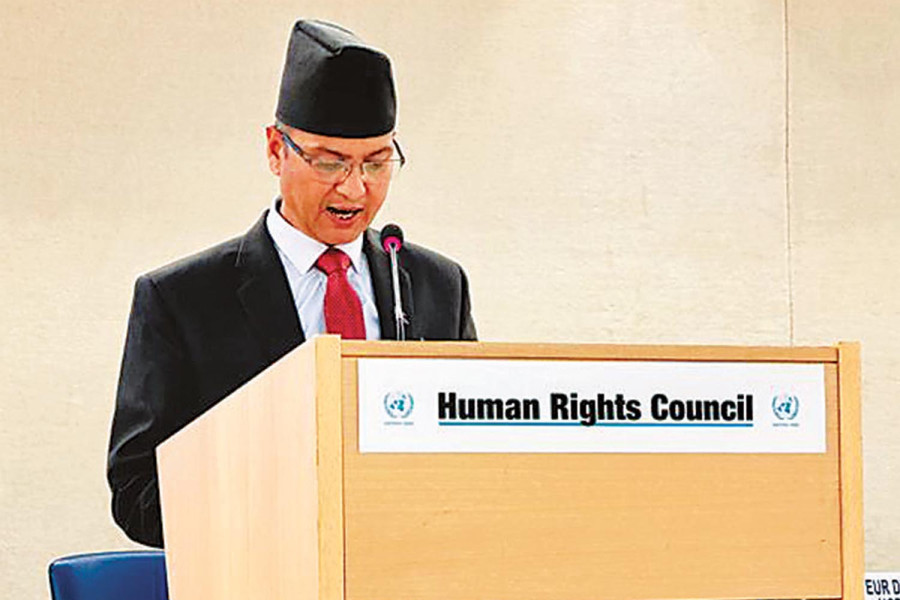National
In Geneva, Nepal pledges justice for the atrocities committed during conflict
Fed up with repeated promises, insurgency victims say.
Binod Ghimire
Nepal has reiterated its commitment to provide justice to the victims of the insurgency-era atrocities after an amendment to the Enforced Disappearances Enquiry, Truth and Reconciliation Commission Act.
Addressing the 52nd session of the UN Human Rights Council in Geneva on Tuesday, Govinda Sharma Bandi, peace and human rights advisor to Prime Minister Pushpa Kamal Dahal, claimed concluding the peace process was high on the government’s priority. “Nepal is close to concluding the peace process by establishing a credible, meaningful and victim-centred transitional justice process,” he said. “My delegation assures that there will be no amnesty for serious human rights violations.”
The erstwhile Sher Bahadur Deuba government had on July 15 last year introduced a bill to amend the Act in parliament. It couldn’t get through the House because of serious reservations from conflict victims, national and international human rights organisations and activists over some of the clauses. They said the bill had provisions for amnesty even in serious violations of human rights like murder.
Bandi told the council that the bill was prepared after conducting nationwide consultations with relevant stakeholders including victims. The tenure of the House of Representatives expired before its endorsement, he said. If Nepal's commitment in the council is anything to go by, the government will table a new bill in Parliament soon to amend the Act.
“While amending the law, the concerns of the victim, civil society and other stakeholders will be taken into account,” said Bandi. “My delegation also assures that the amendment will be in line with the Supreme Court ruling and Nepal’s obligations under relevant provision of international law, Comprehensive Peace Accord and victim’s concern.”
Truth, justice, reparation, reconciliation and institutional reform would be the highlights of the amendment while also recognising reparation as a right of victims, according to Bandi.
The conflict victims, however, say they have, for years, been hearing the government’s commitment for justice for years but nothing has materialised. “There is nothing new in Bandi’s commitment. For years, different government’s have been making similar commitments in the United Nations and other international forums,” Suman Adhikari, a founding chairperson of the Conflict Victims Common Platform, told the Post. “We are fed up with hollow commitments. I am also surprised that the international community believes the same result-less commitment Nepal has been making for years.”
He said conflict victims don’t believe the commitments made by the government at the Human Rights Council because Bandi himself was the minister for law and justice last year when an amendment bill proposing amnesty was brought in Parliament. Deuba in April last year appointed Bandi as minister and tasked him to amend the Act in line with the 2015 verdict of the Supreme Court that had struck down the amnesty provision in the Act.
Though the bill had some progressive provisions, it met with criticisms because it retained the amnesty provisions.
The bill said “cruel murder”—murder after torture, rape, enforced disappearances and inhumane or cruel torture committed against unarmed or ordinary people during the insurgency are serious human rights violations—is non-amnestiable.
The bill has opened the door for amnesty for murder by stating that only “cruel murder” will be non-amnestiable, thus providing a loophole to define all murders as non-cruel, the victims said. The bill also didn’t list war crimes and crimes against humanity under serious human rights violations.
In his address Tuesday, Bandi said the new bill be tabled after incorporating suggestions of the parties concerned.
The victims say they want to see the commitments translated into action. Kalyan Budhathoki, acting chairperson of the Conflict Victims Common Platform, said the government must stop fooling the international community. “We want to see the government walk the talk,” he told the Post. “However, I don’t have much hope.”
The government on Monday appointed Bandi as the head of the delegation after Bimala Rai Poudyal, then foreign minister, cancelled her Geneva visit as per Dahal’s suggestion. “It was obvious for me to lead the delegation as the senior most members as Poudyal didn’t make it to Geneva for political reasons,” he said.
Dahal’s ministers say the prime minister stopped Poudyal from flying because CPN-UML was planning to pull out of the government and it wouldn’t have been good had Poudyal lost her ministerial position while abroad. Earlier the Cabinet had decided to send a delegation to Geneva led by Poudyal where Bandi was a member.
Ram Bhandari, a conflict victim and rights defender, however said he is hopeful of the transitional justice process moving in the right track as the incumbent government has prioritised the issue. “In our recent meeting, the prime minister said the bill will be registered in parliament very soon by addressing concerns of all quarters,” he said. “The government has made a similar pledge in Geneva. I hope it stands by its commitment.”




 18.12°C Kathmandu
18.12°C Kathmandu














